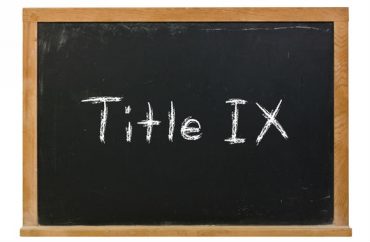
Praised for inviting ‘informed feedback’ rather than issuing decrees
College professors have unexpectedly found common cause with the Trump administration on campus sexual misconduct proceedings.
The American Association of University Professors is backing some parts of the Department of Education’s proposed Title IX regulation, including a heightened evidence standard, while asking for greater explicit protections for faculty.
It’s not the only left-leaning organization to show its support. Feminist Harvard Law School scholars, including a retired federal judge, credit the proposal with reforming “unfair Title IX processes.” Other groups that support due process largely back the proposal.
Though more than 100,000 comments have been filed in the regulatory proceeding, the department is reopening the comment period for one day on Friday, in response to technical problems with filing comments near the end of the original 60-day window.
Education Secretary Betsy DeVos’s* decision to solicit public comment at all is “significant,” said the Foundation for Individual Rights in Education.
The education civil-liberties group praised the government “for following formal rulemaking procedures to implement these changes, instead of mandating them through ‘guidance’ or ‘Dear Colleague’ letters” as the Obama administration did. This means that “informed feedback” can be part of the revision process.
Students accuse professors because they teach ‘gender difference’
The AAUP told the department that its constituents have “unique circumstances” that are not “adequately considered” in the proposal.
It wants the department to explicitly “recognize that academic freedom is central to faculty speech,” whether in public or private universities. The current proposal makes only “a gesture to the First Amendment.”
The group pointed to sexual harassment investigations against professors in response to student complaints about their statements in the classroom.
“University administrators have taken disciplinary action against faculty based on student objections that a teacher’s use of language or examples were sexual harassment when they patently were not,” the AAUP wrote, noting the “serious and scholarly” nature of such content.
“These kind of cases point to a need for Title IX coordinators with experience in the workings of the university as an academic institution,” it said. “In some cases, Title IX has given disproportionate power to student accusations” on subject matter such as teaching about “gender difference (based on scientific findings and lived experience).”
AAUP supports the use of the “clear and convincing” evidence standard in faculty proceedings because of the severe “risk to livelihood and reputation” they face when accused of sexual misconduct. That standard “will also guard against well-documented racial bias in sexual harassment cases for students and faculty alike.”
The “preponderance” standard – mandated by the Obama administration in student proceedings – threatens the academic freedom of faculty, the group said. The department’s proposal requires colleges to use the same evidence standard for both students and faculty.
Overall, the department should instruct colleges to apply their rules “so as to protect academic freedom, free speech, and due process.”
The AAUP did object to a proposed rule that would eliminate the requirement for religious institutions to submit a written request for a Title IX exemption.
This is a “reasonable requirement to ensure that any claimed religious exemption is sufficiently supported by a specific tenet of the religion,” it said. “It is difficult to conceive of a religious tenet that is inconsistent with prohibiting sexual assault and other forms of sexual harassment.”
‘Title IX Coordinator should not have a role in hiring or firing them’
Jeannie Suk Gersen, Nancy Gertner and Janet Halley of Harvard Law called the Title IX adjudication practices that followed the Obama administration’s 2011 guidance “a perfect storm of due process violations and a loss of legitimacy for important Title IX enforcement.”
In their joint comments, the Ivy League scholars added several critiques to their support for the general direction of the proposal.
The proposal doesn’t go far enough in protecting the independence of Title IX investigations, they said. Though it prevents the Title IX coordinator from serving as the “decision-maker,” the proposal still allows the coordinator to be “an employment supervisor of the decision-maker in the school’s administrative hierarchy.”
If those who make decisions are “independent contractors, the Title IX Coordinator should not have a role in hiring or firing them,” the scholars wrote. This would also give the decision-maker “the power to check bias against complainants or respondents in the Title IX Coordinator’s office.”
But the Harvard faculty took issue with a proposed requirement of cross-examination, even through a party’s counsel, saying it’s outside the “overall legal mandate of Title IX.”
Cross-examination outside the “controlled” environment of a courtroom can “unleash unfair and hurtful techniques that would harm parties’ educational access,” they said, and it could even prejudice accused students.
Under the proposal, the decision-maker would be instructed to disregard statements by parties that refuse to be cross-examined. If lawyers for the accused tell them “not to answer questions in order to preserve criminal trial rights,” their statements would be ignored, which could “severely distort the accuracy of the final decision,” the faculty said.
Instead, they suggest using Harvard Law’s substitute for cross-examination, known as the “submitted-questions procedure,” where the decision-maker asks each party’s questions to the other but screens out “irrelevant … harassing, or duplicative” questions.
This specific proposal is at odds with several federal and state court rulings, particularly from the 6th U.S. Circuit Court of Appeals, that require a procedure more like cross-examination than Harvard Law’s system.
Correct to call them ‘complainants,’ not ‘victims’
FIRE, the education civil-liberties group, praised a proposed change in how colleges refer to the parties in Title IX investigations are referred to.
The proposal avoids the term “victim,” and instead uses the terms “complainant” and “respondent.” The “victim” language, when used “before there has been any investigation or adjudication,” FIRE wrote, “is inappropriate because it assumes the accuracy of allegations, turning the principle of ‘innocent until proven guilty’ on its head.”
FIRE expressed support for the proposed advisor requirement. It is “unreasonable” for students to “adequately defend their interests in judicial proceedings against campus administrators or institutional attorneys.”
“Active representation is necessary not only for the fairness of campus adjudications,” FIRE wrote, “but also because of the potential ramifications of any concurrent or subsequent criminal prosecution based on the conduct at issue in the campus judicial proceeding.”
Many students could be coerced to testify against themselves in a university proceeding, thus violating their Fifth Amendment rights, as such testimony would be acceptable evidence in a courtroom trial, FIRE said.
Stop Abusive and Violent Environments, a due process rights group, praised the proposed regulation. Once put in place, it will “remedy widespread sex bias against male students at colleges and universities.”
‘Wild, unsubstantiated’ claim by major law firm about sexual assault
Among the many comments to denounce the proposed regulation was one filed by the law firm Gibson Dunn on behalf of the accuser rights group Sanctuary for Families.
Calling the proposed regulation “nothing short of a wholesale effort to eviscerate Title IX as a mechanism to address sexual misconduct on campus,” the organization leveled numerous criticisms.
It would “require schools to ignore reports of sexual misconduct,” Sanctuary for Families said. It cited the proposed narrower definition of sexual assault and harassment – in line with Supreme Court precedent – as evidence for the claim.
The group praised the Obama administration’s 2011 guidance, claiming that it “was widely praised as striking the right balance between protecting the accused and facilitating the reporting and fair evaluation of complaints of sexual assault and sexual harassment on campus.”
Sanctuary for Families cited the disputed statistic that one in five undergraduate women experience sexual assault, and claimed “during the past decade, rates of sexual violence have skyrocketed on college campuses across the country.”
Brooklyn College Prof. KC Johnson, who closely tracks Title IX litigation, faulted Gibson Dunn for making that “wild, unsubstantiated” claim in its comment. The “usual argument” is that the reporting of sexual assaults had gone up, not actual assaults, he wrote in a Twitter thread.
He also mocked the law firm’s basis for denouncing cross-examination in the Title IX context. Gibson Dunn cited “court transcripts in 1950s Australia and 1990s/2000s New Zealand.”
Major law firm (@gibsondunn) produces a comment opposing DeVos TIX regs opening with wild, unsubstianted, claim: "During the past decade, rates of sexual violence have skyrocketed on college campuses across the country." (Usual argument: *reporting*–not *violence*–increased.) pic.twitter.com/NhtsRtoi3G
— KC Johnson (@kcjohnson9) January 29, 2019
IMAGE: CLS Digital Arts/Shutterstock
Like The College Fix on Facebook / Follow us on Twitter






Please join the conversation about our stories on Facebook, Twitter, Instagram, Reddit, MeWe, Rumble, Gab, Minds and Gettr.